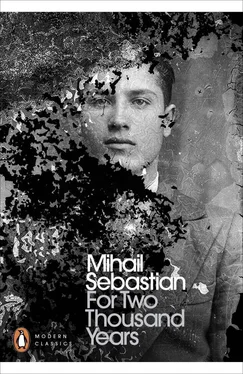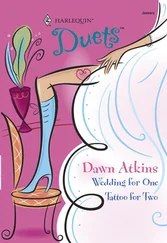The way she responded to my greeting, with the same attentive tilt of the head which I knew from before, reminded me suddenly that I had loved this girl and it struck me as unusually comic that now we were such strangers, separated by the glass of a train window, like a barrier between two worlds.
The courier arrived on the following train. I swore terribly at him. He had found it necessary to talk politics with the stationmaster for two hours.
*
Marjorie Dunton came by the oilfield in the morning. I was covered with dust, my hands dirty, my hair messed up, and I didn’t want to go down. She greeted me from below.
‘I was waiting for you last night with new records. You’re a deserter.’
‘Sorry, I had work to do. If you’ll have me, I’ll come this evening.’
‘Can’t this evening. We’re going to the Nicholsons’. Phill has promised a game of bridge. Come along yourself.’
She was dressed in white. Marin Dronţu is right: white doesn’t suit her. She’s incredibly blonde — the white-blonde of corn straw. Light colours make her inexpressive. In the sun her eyes, which are green, turn violet, her cheeks lose the contour which usually shadows them towards the corners of her lips and the line of her neck no longer reveals that fine familiar curve.
I watched her for a long time as she went away, jumping carelessly from one stone to another, between rubble and plaster.
I’ve often wondered what kind of a life Marjorie Dunton leads. She doesn’t love her husband, and he doesn’t love her. This at least is clear between them. They have common interests which make their partnership pleasant: music, skiing, swimming. They also have their individual preferences. He likes bridge and she likes novels.
Enough for a marriage between two such intelligent people. Still, I find it hard to believe you can get by on so little. At least Phill has the refinery laboratory, where he can continue his work and perform experiments. But what has Marjorie got?
Young Dogany suffers in vain. I don’t think Marjorie will ever love him. I don’t think she’ll ever love anyone. I say that with a certain sadness, but a certain pleasure too, as I wonder if I wouldn’t suffer knowing her to be in someone else’s arms. I can’t explain it, because I’ve never expected anything beyond the fact that we get on well together.
Three years ago, when the Duntons came here, Marjorie intimidated me. I was afraid of what might happen. I had so much work to do, and God knows I didn’t need romantic complications. Things resolved themselves naturally. Marjorie is excellent company.
Back then we were reading Emily Brontë’s Wuthering Heights . I remember speaking animatedly about the book, about its passion, about the hallucinatory poetry of its heroes. She knew the book, but didn’t like it.
‘I don’t like overwrought books,’ she said. ‘If you’re interested in the Brontë sisters, I recommend Charlotte. She’s simpler, “homelier”, calmer.’
She lent me Shirley , Charlotte Brontë’s novel, which I loved straight away, on first reading. It was relaxing, clear, with a certain juvenile naivety, through which I tried to see Marjorie Dunton. I congratulated her on her discrimination, which later I saw reconfirmed many times in literature and music.
I asked her once if she’d ever thought of writing. She laughed. ‘What a notion!’ Still, when I get a letter from her in Bucharest in winter, I’m amazed at the liveliness with which she imbues little happenings, the images she evokes, how she can lightly, negligently, drop a confession between the lines.
*
I’d been working all day and, tired as I was, hadn’t expected I’d stay so late at the Nicholsons’. These people have managed to create here, in Prahova, in Uioara, real society life.
It’s probably their national character. At first their insistence on keeping up society manners here in the back of beyond struck me as somehow comic. Marjorie dresses fancifully only in the morning. She is a passionate adherent of evening dress. The men always come to dinner in black coats. I tried to rebel in favour of short-sleeved shirts with open collars, but had to accept defeat.
Once, concerning this matter, Eva Nicholson said something silly and over-excited to me:
‘You’re wrong to laugh at this. It’s not frivolous. It’s something more serious, it’s a matter of dignity; no, it’s a matter of salvation. If, because we’re on our own, because nobody sees us, we conceded a little of what you consider society manners, and a little more tomorrow, we’d wake up one morning living in the most terrible promiscuity. It would be unbearable. Without black tie and evening gown, nobody would have any real privacy. Privacy is such a fragile thing and it’s worth making sacrifices for.’
Though I don’t entirely follow Mrs Nicholson’s reasoning, I have to admit that their strict dress code evenings are relaxed and welcoming. I have a sense of freedom, well-being, of simple elegance.
Marjorie played Déodat de Séverac on the piano, the Debussy-ist she recently discovered. It’s amusing to watch young Pierre Dogany listening as he leans against the corner of the piano, visibly sad and happy. His strange head has both Semitic and Mongolian features. He really is handsome, this boy, and deeply appealing in his unrequited love for Marjorie. Marjorie looks at him directly, loyally, as if to say: ‘It’s nothing, Pierre, it’ll pass, you’ll see.’ At the end of September he has to return to Budapest to sit exams, and the prospect is already weighing on him.
We left late, together, and walked to the Duntons’. Then he walked a bit with me, towards the cabin. He recited some verses by Endre Ady but wouldn’t translate them for me. His voice trembled and I could feel how furious that made him.
Entering my room, I probably woke Dronţu who, from beyond, struggling out of sleep, couldn’t keep from shouting out to me once again:
‘See how you waste your nights? That Marjorie’s going to wear you out. And not one of you is up to the job. You call yourselves men …’
*
What a surprise, meeting S.T. Haim in the casino in Sinaia. A pipe on the construction site had burst, right in my work area, and I suddenly found myself with a few free hours. I didn’t feel like conversation or reading, and, as Hacker was leaving with the Ford for Predeal, where he has a sick daughter, I asked him to drop me off in Sinaia.
Same old S.T.H. Blond, kinky-haired, short, with extraordinarily intelligent eyes, alive to everything, the flash of a smile or the beat of a pulse; his agitated hands twitching with the impatience to express too much. ‘He has too many gestures and only two hands,’ Winkler used to say.
He had completely disappeared for the past few years. I can’t have caught sight of him more than a couple of times, from afar, in the street. He went abroad, travelled extensively, had a few love affairs, made some good business decisions. Now he’s working with some very profitable foreign engineering firms. His doctoral thesis in mathematics caused a bit of a stir in the university, but that was three or four years ago and I don’t think he cares much for maths these days.
‘I’m like those Jewish girls who play Beethoven and Schubert with feeling, then one day get married, stop playing the piano, forget about music, get fat and have children.’
I felt he was telling me this in anticipation of my question, but I don’t actually believe anything he says. In fact, he’s unjust with himself. Money, no matter how rich he may be, has had no effect on his air of being a free man, ready to lose everything and start from scratch. He has that rather childlike and distracted air that people with an interior life retain in wealth; a sign that wealth, even if they aren’t indifferent to it, is certainly not indispensable to their identity. Off-handedness is the humour of elegance, and I don’t know a true intellectual whose elegance does not involve this kind of humour. S.T.H. certainly has it. His silk shirts, his flannel suits from London, his fine bulky shoes, the delicately patterned tie — not only is he not intimidated by any of this, but he treats it all with bonhomie, as if they’re amusing trifles.
Читать дальше












